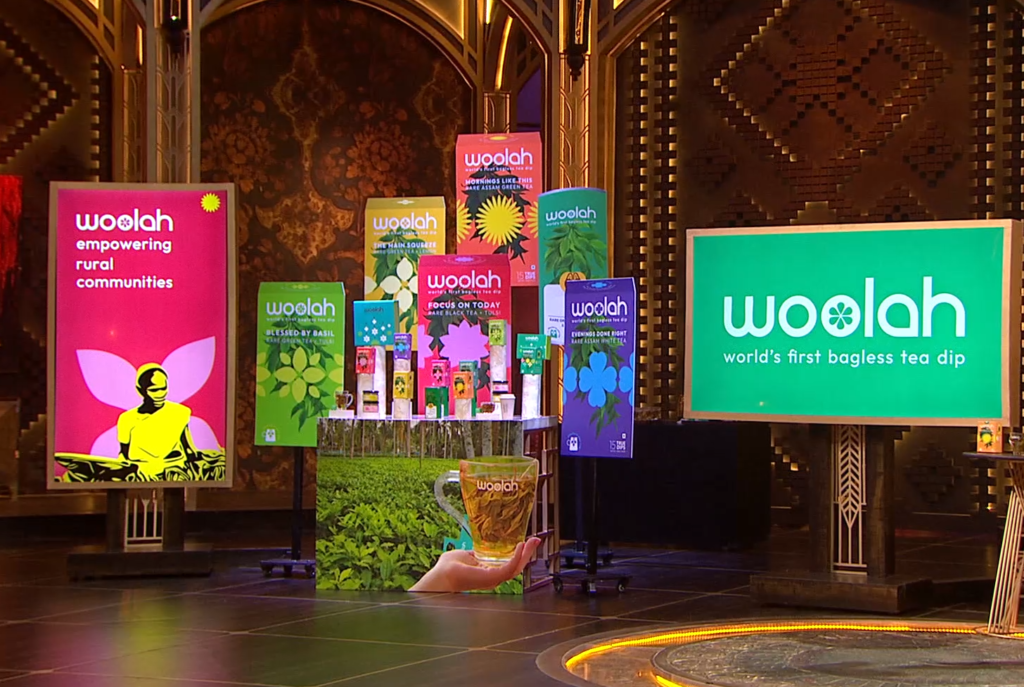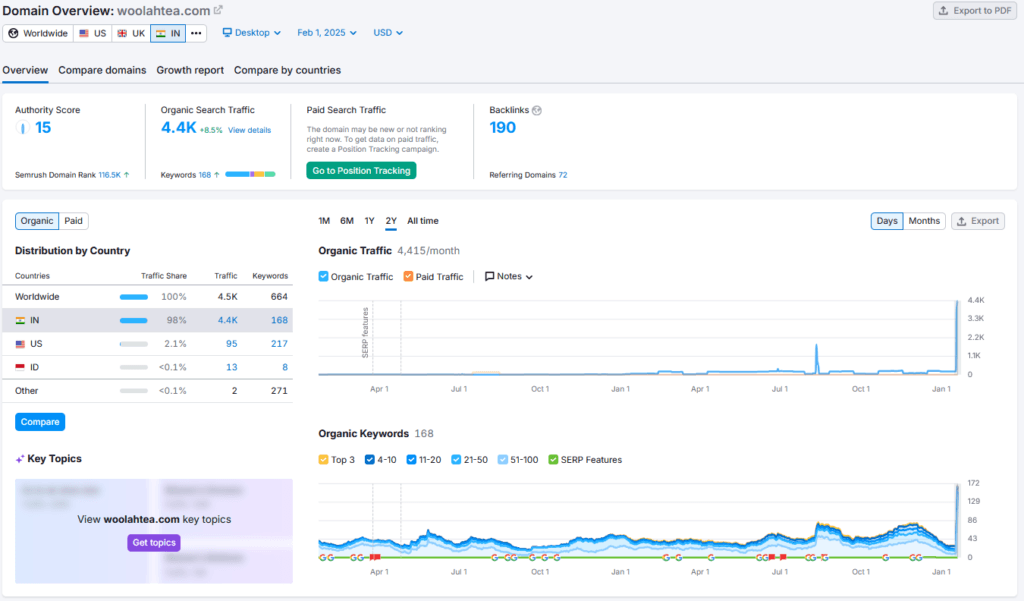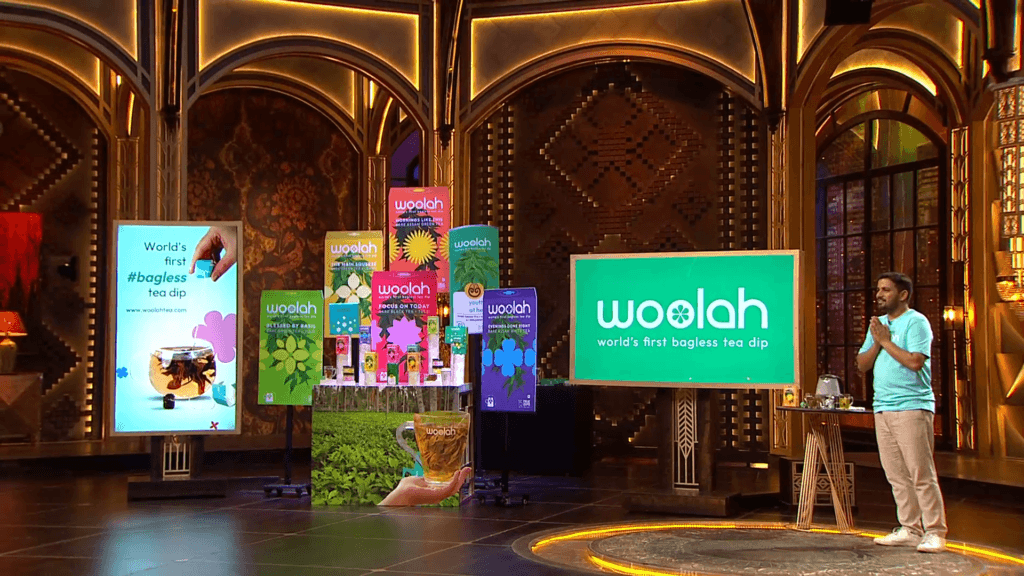Woolah Tea Shark Tank India Episode Review
Website Information
- Website:- Woolah Tea
- Build on E-commerce Shopify
- Good SEO Performance but SEO improvement is needed.
- ORGANIC TRAFFIC: 4.4K visitors per month.
Founder
- Upamanyu Borkakoty, the founder of Woolah Tea, established the company in 2020.
- His inspiration stems from his uncle’s passion for tea tasting and his efforts to improve lives through an NGO, which motivated him to innovate within Assam’s tea industry.

Brand Overview
- Woolah Tea is an innovative tea brand based in Assam, India, known for its unique bagless tea balls.
- The name “Woolah” translates to “happiness” in Assamese, reflecting the brand’s commitment to delivering joy through its eco-friendly products.
- Woolah Tea is recognized for pioneering a patented bagless tea dip that allows consumers to enjoy premium whole-leaf tea without traditional tea bags.
- Since its launch in January 2021, the brand has experienced significant growth, with revenues increasing from ₹13 lakh in FY 2020-21 to ₹2 crore in FY 2023-24.
Shark Tank India Appearance and Ask
- In the 19th episode of Shark Tank India Season 4, Upamanyu sought ₹50 lakh for 1.66% equity, valuing Woolah Tea at ₹30 crore.
- The pitch highlighted the brand’s innovative approach and commitment to sustainability.
Season and Episode Air Date
- Season: 04
- Episode: 19
- Episode Air Date: Thursday, 30 January 2025
Product Overview
- Woolah Tea offers patented green tea balls that bloom into fresh leaves when brewed.
- These tea balls can be reused 2–3 times, making them both economical and sustainable.
- The packaging includes a QR code connecting customers directly to the tea plantations, enhancing traceability and consumer engagement.
Investor Reactions
- The Sharks were impressed by Woolah’s innovative product but raised concerns about marketing challenges and pricing.
- Anupam Mittal offered ₹50 lakh for 5% equity, while Namita Thapar proposed ₹50 lakh for 4.5% equity with a royalty clause.
- Vineeta Singh identified pricing issues but ultimately opted out of the deal.
Customer Engagement Philosophy
- Woolah Tea emphasizes sustainability and quality in its customer engagement strategy.
- By providing biodegradable products and direct connections to tea plantations, the brand aims to enhance consumer experience and promote responsible consumption.
Product Highlights
- Innovative Design: Bagless tea balls that eliminate waste.
- Sustainability: Biodegradable materials used in product packaging.
- Reusability: Each tea ball can be brewed multiple times.
- Traceability: QR codes on packaging link consumers to the source of their tea.
Future Vision
- Woolah Tea aims to expand its product portfolio by introducing more regional and specialty teas while strengthening its distribution network through both direct-to-consumer channels and retail partnerships.
- The brand seeks to continue innovating its packaging and enhancing the overall tea-drinking experience as it grows in the market.
Deal Finalized or Not
- After negotiations, Upamanyu finalized a deal with Aman Gupta, securing ₹50 lakh for 2.5% equity plus 2.5% advisory equity, which valued the company at ₹20 crore.
- This deal was particularly appealing as it came without additional conditions.

| Category | Details |
|---|---|
| Website Information | |
| Website | Woolah Tea |
| Built on | E-commerce Shopify |
| SEO Performance | Good, but improvement needed |
| Organic Traffic | 4.4K visitors per month |
| Founder | |
| Name | Upamanyu Borkakoty |
| Inspiration | His uncle’s passion for tea tasting and NGO work inspired him to innovate Assam’s tea industry. |
| Brand Overview | |
| Established | 2020 |
| Location | Assam, India |
| Specialization | Bagless tea balls |
| Mission | Deliver joy through eco-friendly, sustainable tea products |
| Innovation | Patented bagless tea dip technology |
| Revenue Growth | ₹13 lakh (FY 2020-21) → ₹2 crore (FY 2023-24) |
| Shark Tank India Appearance & Ask | |
| Season | 04 |
| Episode | 19 |
| Episode Air Date | Thursday, 30 January 2025 |
| Investment Sought | ₹50 lakh for 1.66% equity |
| Valuation | ₹30 crore |
| Product Overview | |
| Product | Patented green tea balls |
| Unique Features | Bloom into fresh leaves when brewed, can be reused 2-3 times |
| Sustainability | Eco-friendly, biodegradable materials |
| Traceability | QR codes on packaging link customers to tea plantations |
| Investor Reactions | |
| Anupam Mittal | Offered ₹50 lakh for 5% equity |
| Namita Thapar | Offered ₹50 lakh for 4.5% equity with royalty clause |
| Vineeta Singh | Opted out due to pricing concerns |
| Deal Finalized | |
| Investor | Aman Gupta |
| Deal | ₹50 lakh for 2.5% equity + 2.5% advisory equity |
| Final Valuation | ₹20 crore |
| Customer Engagement Philosophy | |
| Focus Areas | Sustainability, quality, and direct connections with tea plantations |
| Business Potential in India | |
| Market Growth | 7.06% CAGR (2025-2029) |
| Expected Market Size | US$25.39 billion by 2029 |
| Consumer Trend | Health-conscious and eco-friendly purchasing habits |
| Total Addressable Market (TAM) | |
| Indian Tea Market Size | ₹1.5 lakh crore (~US$18 billion) |
| Premium Tea Segment | Rapid growth driven by demand for organic and whole-leaf teas |
| Ideal Target Audience & Demographics | |
| Age Group | 25-45 years |
| Income Level | Middle to upper-middle class |
| Location | Urban areas (Mumbai, Delhi, Bangalore, etc.) |
| Marketing Strategy | |
| Brand Positioning | Premium, eco-friendly tea alternative |
| Promotional Strategy | Social media ads highlighting sustainability and health benefits |
| Influencer Marketing | Collaborations with health & wellness influencers |
| Content & Digital Marketing | |
| SEO Optimization | Increase organic traffic beyond current 4.4K visitors per month |
| Content Creation | Blogs on tea benefits, sustainability, and recipes |
| Email Marketing | Regular updates on new products, discounts, and tea education |
| Distribution Strategy | |
| E-commerce | Shopify for direct-to-consumer sales |
| Marketplace Partnerships | Amazon, Flipkart |
| Retail Expansion | Health-focused retail outlets and gourmet stores |
| Advantages | |
| Innovative Product | Unique bagless tea balls |
| Sustainability | Biodegradable packaging and reusable tea balls |
| Market Demand | Growth in premium beverages and health-conscious consumers |
| Challenges | |
| Competition | Established tea brands |
| Pricing Sensitivity | Consumers may hesitate to pay a premium price |
| Reasons for Success | |
| Strong Brand Story | Assam’s tea heritage and founder’s personal connection |
| Investor Support | Aman Gupta’s backing for scaling operations |
| Mitigation Strategies | |
| Storytelling in Marketing | Emotional connection with customers through brand story |
| Strategic Partnerships | Regular assessment and adaptation to market trends |
| Future Business Roadmap | |
| Short-Term Goals (1 Year) | Increase production from 10,000 to 50,000 dips/day; improve SEO and marketing |
| Medium-Term Goals (2-3 Years) | Expand product line, strengthen retail partnerships |
| Long-Term Goals (5 Years) | Achieve ₹100 crore valuation, establish Woolah Tea as a leading premium tea brand in India |
Woolah Tea Shark Tank India Business Plan

Business Potential in India
- Market Growth: The tea market in India is projected to grow by 7.06% from 2025 to 2029, reaching a market volume of US$25.39 billion by 20296.
- Health-Conscious Consumers: There is a rising trend among consumers towards health and wellness, leading to increased demand for premium and organic tea products.
- Sustainability Focus: With growing awareness of environmental issues, eco-friendly products like Woolah Tea’s bagless tea balls are likely to attract more consumers.
Total Addressable Market (TAM)
- Current Market Size: The Indian tea market is valued at approximately ₹1.5 lakh crore (around US$18 billion) as of 2023.
- Premium Segment Growth: The premium tea segment is expected to grow significantly, driven by the demand for whole-leaf and organic teas, which Woolah Tea specializes in.
Ideal Target Audience and Demographics
- Age Group: Primarily targeting consumers aged 25-45 years who are health-conscious and environmentally aware.
- Income Level: Middle to upper-middle class with disposable income willing to spend on premium products.
- Geographic Focus: Urban areas with a higher concentration of health-conscious consumers, especially in metropolitan cities like Mumbai, Delhi, and Bangalore.
Marketing Strategy for Woolah Tea
- Brand Positioning: Position Woolah Tea as a premium, eco-friendly alternative to traditional tea bags.
- Promotional Campaigns: Use social media platforms to run targeted ads showcasing the unique features of the product and its sustainability benefits.
- Influencer Collaborations: Partner with health and wellness influencers to reach a broader audience.
Content and Digital Marketing Strategy
- SEO Optimization: Improve website SEO performance to increase organic traffic from the current 4.4K visitors per month.
- Content Creation: Develop engaging blog posts about the health benefits of whole-leaf tea, sustainable practices, and recipes using Woolah Tea products.
- Email Marketing: Implement an email marketing strategy to keep customers informed about new products, discounts, and educational content related to tea.
Distribution Strategy for Woolah Tea
- E-commerce Platforms: Utilize Shopify for direct-to-consumer sales while exploring partnerships with major e-commerce platforms like Amazon and Flipkart.
- Retail Partnerships: Establish collaborations with health-focused retail outlets and gourmet stores to increase physical presence.
Advantages of Woolah Tea
- Innovative Product Design: Unique bagless tea balls that enhance the consumer experience.
- Sustainability Commitment: Eco-friendly packaging and product design that appeals to environmentally conscious consumers.
- Growing Market Demand: Aligns with trends towards premium beverages and health-conscious consumption.
Challenges Faced by Woolah Tea
- Market Competition: Facing competition from established brands in the tea market.
- Pricing Sensitivity: Consumers may be hesitant to pay a premium price for new products without established brand recognition.
Reasons for Success and Mitigation Strategies
- Strong Brand Story: Upamanyu Borkakoty’s personal connection to Assam’s tea heritage can resonate with consumers.
- Mitigation: Leverage storytelling in marketing campaigns to build emotional connections.
- Strategic Partnerships Post-Shark Tank: The deal with Aman Gupta provides not only financial backing but also mentorship for scaling operations.
- Mitigation: Regularly assess partnership effectiveness and adjust strategies based on feedback.
Future Business Roadmap for Woolah Tea
Short-Term Goals (1 Year):
- Increase production capacity from 10,000 dips per day to 50,000 dips per day2.
- Enhance online presence through improved SEO and digital marketing efforts.
Medium-Term Goals (2-3 Years):
- Expand product line to include regional and specialty teas.
- Strengthen distribution networks through retail partnerships.
Long-Term Goals (5 Years):
- Achieve a valuation target of ₹100 crore through sustained growth and market penetration.
- Establish Woolah Tea as a household name in the premium tea segment across India.
By focusing on innovation, sustainability, and strategic marketing, Woolah Tea has the potential to capture significant market share in India’s evolving beverage landscape.



Woolah Tea Shark Tank India Episode Review